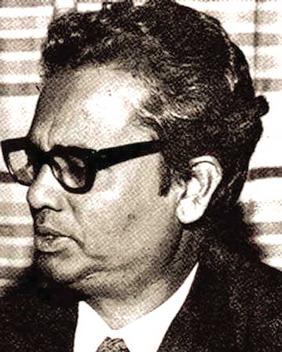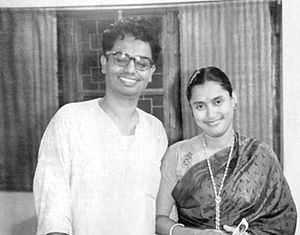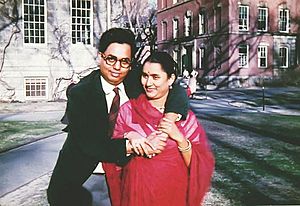Munier Choudhury facts for kids
Quick facts for kids
Munier Choudhury
|
|
|---|---|
| মুনীর চৌধুরী | |
 |
|
| Born | 27 November 1925 |
| Died | 14 December 1971 (aged 46) |
| Nationality | Bangladeshi |
| Education | MA (linguistics) |
| Alma mater | Aligarh Muslim University University of Dhaka Harvard University |
| Children |
|
| Relatives | Ferdousi Mazumder (sister) Kabir Chowdhury (brother) Ashfaque Munier (Son) |
| Awards | full list |
Munier Choudhury (born November 27, 1925 – died December 14, 1971) was a famous Bangladeshi teacher, writer, and a brave person who stood up for what he believed in. He was one of many smart people who were killed in Bangladesh in 1971. After his death, he was given the Independence Day Award in 1980, which is a very important honor.
Contents
Early Life and Education
Munier Choudhury was born on November 27, 1925, in Manikganj. His family originally came from Noakhali District. His father, Khan Bahadur Abdul Halim Chowdhury, was a district magistrate. His mother was Umme Kabir Afia Begum. Because his father's job moved them around, Munier lived in different parts of East Bengal. In 1936, his family finally settled in Dhaka.
He finished school at Dhaka Collegiate School in 1941. He then studied at Aligarh Muslim University. Later, he went to the University of Dhaka where he earned his bachelor's and master's degrees in English literature. He was asked to leave his student dorm because he was involved in groups that wanted big changes for society.
In 1952, he was put in jail for two years because he took part in the Bengali Language Movement. This was a big protest to make Bengali an official language. While he was in jail in 1954, he took his master's exam in Bengali literature and got the highest marks. Later, in 1958, he earned another master's degree in linguistics from Harvard University in the United States.
Academic Career
Munier Choudhury started teaching in 1947 at Brajalal College in Khulna. In 1950, he moved to Jagannath College in Dhaka. Later that same year, he joined the University of Dhaka. He taught both English and Bengali there until 1971. He became a senior lecturer in 1962 and a professor in 1970. In 1971, he became the dean of the arts faculty.
Standing Up for Rights
Munier Choudhury was always involved in movements that wanted social change and supported new ideas in culture. In 1948, he went to a meeting in Kolkata about making society fairer. He was chosen as the Secretary of the "Progressive Writers and Artists Association."
In 1952, he was arrested for protesting against the police and the killing of students during the Language Movement. In 1967, he spoke out against the government's decision to stop people from listening to songs by the famous poet Rabindranath Tagore on radio and TV.
In the early 1950s, there was a plan in Pakistan to change the Bengali language alphabet to the Arabic alphabet. As an expert in languages and a writer, Munier Choudhury strongly opposed this. He felt it would harm the native language of East Pakistan. In early 1971, he actively joined the movement where people refused to cooperate with the government. He even gave back an award called Sitara-e-Imtiaz, which the Government of Pakistan had given him in 1966. This showed his strong disagreement with their actions.
Literary Works
While he was in prison from 1952 to 1954, Munier Choudhury wrote a famous play called Kabar (The Grave). This play was a symbol of the historic language movement. After he was released, he continued to write. Some of his well-known works include:
- Roktakto Prantor (1959): A play about the Third Battle of Panipat.
- Chithi (1966)
- Polashi Barrack O Onyanno (1969)
In 1965, Munier Choudhury helped design a new keyboard for the Bangla typewriter. It was named Munier Optima Keyboard. He worked with Remington typewriters from East Germany on this project.
Other important works by him include:
- Mir-Manas, 1965 – a book where he looked closely at the writings of Mir Mosharraf Hossain.
- Ektala-Dotala, 1965 – this was the first ever Bengali play shown on television.
- Dandakaranya, 1966
- Tulanamulak Samalochana (Comparative critique), 1969
- Bangla Gadyariti (Bengali literary style), 1970
Awards
Munier Choudhury received many awards for his work:
- Bangla Academy Literary Award (1962)
- Daud Prize (1965)
- Sitara-i-Imtiaz (he gave this back in 1966)
- Independence Day Award (given after his death, 1980)
- Bangladesh Mujibnagar Staff Welfare Association Commemoration (after his death, 1992)
- Language Activist and Political Prisoner Council Commemoration (after his death, 1993)
- Liberation War Teachers' Council Commemoration (after his death, 1996)
- Dhaka University Alumni Association Commemoration (after his death, 2018)
- Dhaka Metropolitan Police Commemoration (after his death, 2019)
Death
When the Pakistani army started attacking in 1971, Munier Choudhury managed to escape from the University of Dhaka area. He moved to his parents' house. On December 14, 1971, he and many other Bangladeshi intellectuals, teachers, doctors, and engineers were taken from their homes. They were later killed by the Pakistan Army and their local helpers, Al-Badr and Al-Shams. His body was never found.
Years later, on July 18, 2013, Munier Choudhury's son, Asif Munier Chowdhury Tonmoy, spoke in front of a special court called the International Crimes Tribunal-2. He said that two people, Chowdhury Mueen-Uddin and Ashrafuz Zaman Khan, were directly involved in taking his father away and killing him. On November 3 of the same year, the court found both of them responsible for the abduction and murders of 18 people. These included nine teachers from Dhaka University (like Munier Choudhury), six journalists, and three doctors, all in December 1971.
Personal Life
Munier Choudhury was married to Lily Choudhury. They had three sons: Ahmed Munier, Ashfaque Munier (also known as Mishuk), and Asif Munier. Ashfaq became a cinematographer. Ahmed worked for the United Nations in Africa before retiring. Asif is a human rights activist and works to help communities. He also helped start a human rights group called Projonmo Ekattor.
Munier Choudhury had many notable brothers and sisters. His sister, Ferdousi Mazumder, is a famous actress. His brother, Kabir Chowdhury, was a National Professor. Another brother, Shamsher Choudhury, was a columnist. His sister, Nadera Begum, was involved in the language movement. His brother, Lt. Colonel Abdul Qayyum, was the first Bengali Cadet to win the Sword of Honour at the Pakistan Military Academy.
Legacy
Munier Choudhury's memory lives on in many ways:
- Since 1989, a theater group in Bangladesh called Theatre gives an award called Munier Chowdhury Shammanona to people who have done great work in theater.
- The Bangla Academy gives the Shaheed Munier Choudhury Memorial Award to book publishers for making high-quality and beautiful books.
- Central Road, the street in Dhaka where he lived, was renamed Shaheed Munier Chowdhury Road in his honor.
- In 1991, to celebrate 20 years of Bangladesh's independence, the government released a special stamp featuring Munier Choudhury.
- On November 27, 2020, Google celebrated his 95th birthday with a special Google Doodle on their homepage.
 | Frances Mary Albrier |
 | Whitney Young |
 | Muhammad Ali |



